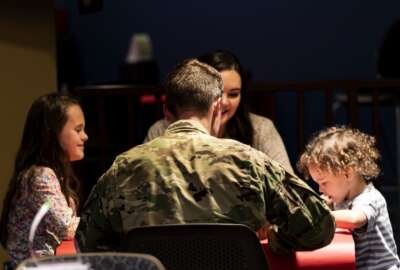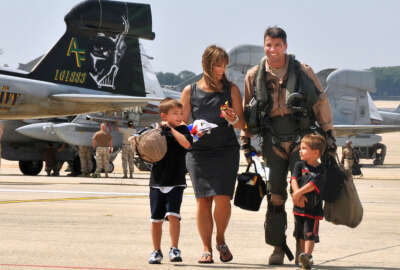To help military families leaving service, the Labor Department is upping its game
The Labor Department is in the early stages of a year-long pilot program for veterans about to leave military service, and their spouses. With how it works, DOL's...
Best listening experience is on Chrome, Firefox or Safari. Subscribe to Federal Drive’s daily audio interviews on Apple Podcasts or PodcastOne.
The Labor Department is in the early stages of a year-long pilot program for veterans about to leave military service, and their spouses. Labor describes it as an enhancement to its long running Veterans Employment and Training Service (VETS). With how it works, Federal Drive with Tom Temin turned to Labor’s deputy assistant secretary for policy for the VETS program, James Rodriguez.
Interview transcript:
Tom Temin: Mr. Rodriguez, good to have you on.
James Rodriguez: Good morning Tom, it’s great to be with you.
Tom Temin: Give us the background here. VETS is Labor Department’s work that parallels some of the work done by the Veterans Affairs Department, and you help people transitioning. Tell us about the pilot program, what it does and how it works.
James Rodriguez: I am glad to really talk about our new employment navigators and what they do within this pilot program. They provide one on one services to transitioning service members and their spouses outside of the traditional TAP workshops, transitioning service members and spouses. We’re going to work with the employment navigators to complete self assessments. They’re also going to do skills testing and explore career options while identifying high demand occupations and necessary credentials to meet the emerging markets and the emerging trends within specific skill sets.
Tom Temin: Okay, let’s back up for a moment. You mentioned something called TAPS. And what is that?
James Rodriguez: So the Transition Assistance Program, it is a three day workshop that transitioning service members who are separated from the military, they have to attend, it’s mandated they attend as they are preparing to transition out of the military service. Department of defense has a one day workshop, the Department of Veterans Affairs has a one day workshop, and Department of Labor, VETS, has a one day workshop.
Tom Temin: So that adds up to three days hearing from three different parties to help these members. Until now has it extended to spouses, because the new enhanced pilot includes the spouses of the military members.
James Rodriguez: Well, we’ve actually began a Transition Employment Assistance for Military Spouses program that we are currently piloting right now. Now prior, we would provide training to military spouses, but this program itself is specifically geared towards military spouses, the TEAMS program that I just mentioned.
Tom Temin: Got it. And you mentioned something called a navigator. That’s a human being, correct? Not a piece of software.
James Rodriguez: That is correct. It’s an employment navigator is what we call them., and we call our program, the Employment Navigator Partnership.
Tom Temin: Okay. So the enhancement then is bringing in the spouses into this whole TAP idea, because I guess it’s predicated on the fact that lots of spouses work already and want to continue working after their spouses out of the military.
James Rodriguez: That is 100% correct. And we also understand that our military spouses are highly qualified, and in many cases, very highly educated, and they have skill sets that can obviously be utilized in the workforce. But we do know that they have some challenges in navigating that transition just like their service members’ spouses do. So we want to support that transition for military spouses just like we do for the military service member.
Tom Temin: What are some of the challenges that a spouse would have as his or her spouse leaves the military and becomes a civilian?
James Rodriguez: Yeah, that’s a great question. We know that they face some of the similar challenges that service members obviously face when they’re transitioning out. But a couple of key things are important here to really talk about,. As they do maintain, in many cases, professional licenses in specific career fields, such as the health industry, teaching professions – and when they are looking to transition out of the military from a specific base or specific state, it’s sometimes a challenge finding positions that they can utilize those certificates in and their professional skills. So we want to make sure that we are partnering with the agencies that can support that at the state level. And of course, importantly, from the federal level.
Tom Temin: We’re speaking with James Rodriguez, he’s deputy assistant secretary of labor for the Veterans Employment and Training Service. And what were the signals you were getting that maybe caused labor to realize you need to extend TAPS to spouses?
James Rodriguez: Well, we’ve known that oftentimes when service members are transitioning out, as I often say, their families transition with them. So it is an impact not only on the military spouses but the family as a whole. And so we wanted to provide information resources to support that transition, as I mentioned earlier, and again, when they are looking to get in specific industries or in specific locations. Sometimes information is not readily available to them in reference to their background and skill sets. So we utilize our partners, both non-government and government partners, specifically at the American Job Centers, to help them identify organizations who are military friendly, organizations who are military spouse friendly, and give them information on how to find those careers. But also we make those connections with those organizations through our employment navigators.
Tom Temin: And let’s get into some details. You have this as an online component, this training, this three day TAPS program, but it’s also being offered in person at certain bases.
James Rodriguez: That is correct. Here recently, May 25 through May 27, we conducted a in person workshop for military spouses at Fort Campbell, Kentucky.
Tom Temin: And how many people attended, and what was the breakdown versus men and women?
James Rodriguez: So we had 95% or so women that attended the class, we had two males, but majority of our military spouses are women, so that is kind of par for the course.
Tom Temin: This program is running through next spring, and so what what are the next phases of the pilot?
James Rodriguez: So what we’re going to continue to do is continue to gather information about the resources that are actually working well for our spouses. Recently, in a 2020 DOL survey, 700, military spouses stated they had a professional license or certificate that would benefit from interstate portability. And we know as I mentioned earlier, that most of these licenses are in health and teaching professions, but they also have skill sets in various industries. And we are going to look at those skill sets, we’re going to look at what training work well. And then what other areas of the training that we can improve on. So we’re going to take all of that information and adjust our program as required to meet the needs of our military spouses.
Tom Temin: So part of the training might be able to help people navigate their way, to use the term navigate, through, say, another state’s licensing requirements or bureaucracy so that they can get that license for whatever function they want to perform in the new location.
James Rodriguez: That is correct. And so we’re also going to look at what resources that we have specifically, as I mentioned, with our American Job Centers, our non-governmental partners, we are we getting, if you will, the best bang for our buck in the sense of what partnerships are working well, what other ones can we approve on based off of the resource requirements that are needed to support military spouses.
Tom Temin: And do you ever want to call up a state and say, look we’ve got someone who teaches third grade math in this state, can’t they just, given the service they’ve given to the country, teach third grade math in your state, or whatever the case might be, real estate sales.
James Rodriguez: So we can and we do make calls to states. But as you can imagine, there’s specific requirements with each individual states. If you look at it from a reciprocity standpoint, where they actually provide information, but also will receive information in reference to those credentials – and will the states make a determination on what information and what credentials they are going to utilize to support that credential being transferred within that state.
Tom Temin: And getting back to the pilot then. You did offer it at Fort Campbell in person, will there be other in person offerings? And is it also an online type of thing? And if it’s online, is it live or pre recorded, or how does that work? Is it a big zoom meeting or what?
James Rodriguez: Those are all great questions. And yes, so what we’re going to continue to do is provide the the courses in a virtual format. We also record the training, so spouses, when they have the opportunity, can go back and review the training. We also understand that sometimes military spouses are completely busy with family, other obligations, and they cannot always make it to the in person training or even the scheduled virtual training. So we know through recordings they can access it at different times or when it’s convenient for them. And so we found that that is an important resource for military spouses. So we’re going to continue to do that moving forward.
Tom Temin: And what will your signs be that this should move from a pilot to a permanent program?
James Rodriguez: As we look at the research and we continue to receive responses from our military spouses through surveys after the the training is completed, we’re going to take that information and plan out, and I guess I should say, the schedules for in person and virtual, and figure out what avenue works best for the specific locations and the specific group, spouses at whatever bases we are providing this training at.
Tom Temin: James Rodriguez is deputy assistant secretary of labor for the Veterans Employment and Training Service. Thanks so much for joining me.
James Rodriguez: Well, of course. I appreciate the opportunity to speak to you about our transition assistance program and what we do with our employment navigators, but also more important about what we do to support our military spouses.
Copyright © 2025 Federal News Network. All rights reserved. This website is not intended for users located within the European Economic Area.
Tom Temin is host of the Federal Drive and has been providing insight on federal technology and management issues for more than 30 years.
Follow @tteminWFED







